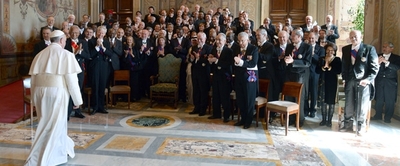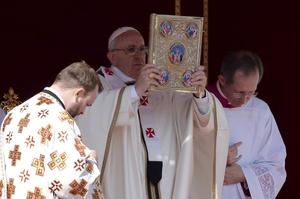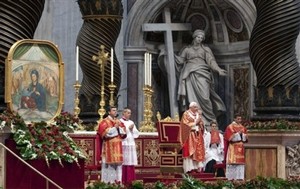I would be remiss if I didn’t offer Pope Benedict XVI’s catechesis on Saint Francis (General Audience, January 27, 2010):
 Dear Brothers and Sisters, […] I would like to present to you the figure of Francis, an authentic “giant” of holiness, who continues to fascinate a great many people of all age groups and every religion.
Dear Brothers and Sisters, […] I would like to present to you the figure of Francis, an authentic “giant” of holiness, who continues to fascinate a great many people of all age groups and every religion.
“A sun was born into the world”. With these words, in the Divine Comedy (Paradiso, Canto XI), the great Italian poet Dante Alighieri alludes to Francis’ birth, which took place in Assisi either at the end of 1181 or the beginning of 1182. As part of a rich family his father was a cloth merchant Francis lived a carefree adolescence and youth, cultivating the chivalrous ideals of the time. At age 20, he took part in a military campaign and was taken prisoner. He became ill and was freed. After his return to Assisi, a slow process of spiritual conversion began within him, which brought him to gradually abandon the worldly lifestyle that he had adopted thus far. The famous episodes of Francis’ meeting with the leper to whom, dismounting from his horse, he gave the kiss of peace and of the message from the Crucifix in the small Church of St Damian, date pack to this period. Three times Christ on the Cross came to life, and told him: “Go, Francis, and repair my Church in ruins“. This simple occurrence of the word of God heard in the Church of St Damian contains a profound symbolism. At that moment St Francis was called to repair the small church, but the ruinous state of the building was a symbol of the dramatic and disquieting situation of the Church herself. At that time the Church had a superficial faith which did not shape or transform life, a scarcely zealous clergy, and a chilling of love. It was an interior destruction of the Church which also brought a decomposition of unity, with the birth of heretical movements. Yet, there at the centre of the Church in ruins was the Crucified Lord, and he spoke: he called for renewal, he called Francis to the manual labour of repairing the small Church of St Damian, the symbol of a much deeper call to renew Christ’s own Church, with her radicality of faith and her loving enthusiasm for Christ. This event, which probably happened in 1205, calls to mind another similar occurrence which took place in 1207: Pope Innocent III’s dream. In it, he saw the Basilica of St John Lateran, the mother of all churches, collapsing and one small and insignificant religious brother supporting the church on his shoulders to prevent it from falling. On the one hand, it is interesting to note that it is not the Pope who was helping to prevent the church from collapsing but rather a small and insignificant brother, whom the Pope recognized in Francis when he later came to visit. Innocent III was a powerful Pope who had a great theological formation and great political influence; nevertheless he was not the one to renew the Church but the small, insignificant religious. It was St Francis, called by God. On the other hand, however, it is important to note that St Francis does not renew the Church without or in opposition to the Pope, but only in communion with him. The two realities go together: the Successor of Peter, the Bishops, the Church founded on the succession of the Apostles and the new charism that the Holy Spirit brought to life at that time for the Church’s renewal. Authentic renewal grew from these together.
Let us return to the life of St Francis. When his father Bernardone reproached him for being too generous to the poor, Francis, standing before the Bishop of Assisi, in a symbolic gesture, stripped off his clothes, thus showing he renounced his paternal inheritance. Just as at the moment of creation, Francis had nothing, only the life that God gave him, into whose hands he delivered himself. He then lived as a hermit, until, in 1208, another fundamental step in his journey of conversion took place. While listening to a passage from the Gospel of Matthew Jesus’ discourse to the apostles whom he sent out on mission Francis felt called to live in poverty and dedicate himself to preaching. Other companions joined him, and in 1209 he travelled to Rome, to propose to Pope Innocent III the plan for a new form of Christian life. He received a fatherly welcome from that great Pontiff, who, enlightened by the Lord, perceived the divine origin of the movement inspired by Francis. The Poverello of Assisi understood that every charism as a gift of the Holy Spirit existed to serve the Body of Christ, which is the Church; therefore he always acted in full communion with the ecclesial authorities. In the life of the Saints there is no contradiction between prophetic charism and the charism of governance, and if tension arises, they know to patiently await the times determined by the Holy Spirit.
Actually, several 19th-century and also 20th-century historians have sought to construct a so-called historical Francis, behind the traditional depiction of the Saint, just as they sought to create a so-called historical Jesus behind the Jesus of the Gospels. This historical Francis would not have been a man of the Church, but rather a man connected directly and solely to Christ, a man that wanted to bring about a renewal of the People of God, without canonical forms or hierarchy. The truth is that St Francis really did have an extremely intimate relationship with Jesus and with the word of God, that he wanted to pursue sine glossa: just as it is, in all its radicality and truth. It is also true that initially he did not intend to create an Order with the necessary canonical forms. Rather he simply wanted, through the word of God and the presence of the Lord, to renew the People of God, to call them back to listening to the word and to literal obedience to Christ. Furthermore, he knew that Christ was never “mine” but is always “ours”, that “I” cannot possess Christ that “I” cannot rebuild in opposition to the Church, her will and her teaching. Instead it is only in communion with the Church built on the Apostolic succession that obedience too, to the word of God can be renewed.
It is also true that Francis had no intention of creating a new Order, but solely that of renewing the People of God for the Lord who comes. He understood, however, through suffering and pain that everything must have its own order and that the law of the Church is necessary to give shape to renewal. Thus he placed himself fully, with his heart, in communion with the Church, with the Pope and with the Bishops. He always knew that the centre of the Church is the Eucharist, where the Body of Christ and his Blood are made present through the priesthood, the Eucharist and the communion of the Church. Wherever the priesthood and the Eucharist and the Church come together, it is there alone that the word of God also dwells. The real historical Francis was the Francis of the Church, and precisely in this way he continues to speak to non-believers and believers of other confessions and religions as well.
Francis and his friars, who were becoming ever more numerous, established themselves at the Portiuncula, or the Church of Santa Maria degli Angeli, the sacred place par excellence of Franciscan spirituality. Even Clare, a young woman of Assisi from a noble family, followed the school of Francis. This became the origin of the Second Franciscan Order, that of the Poor Clares, another experience destined to produce outstanding figures of sainthood in the Church.
Innocent III’s Successor, Pope Honorius III, with his Bull Cum Dilecti in 1218 supported the unique development of the first Friars Minor, who started missions in different European countries, and even in Morocco. In 1219 Francis obtained permission to visit and speak to the Muslim sultan Malik al-Klmil, to preach the Gospel of Jesus there too. I would like to highlight this episode in St Francis’ life, which is very timely. In an age when there was a conflict underway between Christianity and Islam, Francis, intentionally armed only with his faith and personal humility, travelled the path of dialogue effectively. The chronicles tell us that he was given a benevolent welcome and a cordial reception by the Muslim Sultan. It provides a model which should inspire today’s relations between Christians and Muslims: to promote a sincere dialogue, in reciprocal respect and mutual understanding (cf. Nostra Aetate, 3). It appears that later, in 1220, Francis visited the Holy Land, thus sowing a seed that would bear much fruit: his spiritual sons would in fact make of the Sites where Jesus lived a privileged space for their mission. It is with gratitude that I think today of the great merits of the Franciscan Custody of the Holy Land.
On his return to Italy, Francis turned over the administration of his Order to his vicar, Br Pietro Cattani, while the Pope entrusted the rapidly growing Order’s protection to Cardinal Ugolino, the future Supreme Pontiff Gregory IX. For his part, the Founder, dedicated completely to his preaching, which he carried out with great success, compiled his Rule that was then approved by the Pope.
In 1224, at the hermitage in La Verna, Francis had a vision of the Crucified Lord in the form of a seraph and from that encounter received the stigmata from the Seraph Crucifix, thus becoming one with the Crucified Christ. It was a gift, therefore, that expressed his intimate identification with the Lord.
The death of Francis his transitus occurred on the evening of 3 October 1226, in the Portiuncula. After having blessed his spiritual children, he died, lying on the bare earthen floor. Two years later Pope Gregory ix entered him in the roll of saints. A short time after, a great basilica in his honour was constructed in Assisi, still today an extremely popular pilgrim destination. There pilgrims can venerate the Saint’s tomb and take in the frescoes by Giotto, an artist who has magnificently illustrated Francis’ life.
It has been said that Francis represents an alter Christus, that he was truly a living icon of Christ. He has also been called “the brother of Jesus”. Indeed, this was his ideal: to be like Jesus, to contemplate Christ in the Gospel, to love him intensely and to imitate his virtues. In particular, he wished to ascribe interior and exterior poverty with a fundamental value, which he also taught to his spiritual sons. The first Beatitude of the Sermon on the Mount “Blessed are the poor in spirit, for theirs is the kingdom of heaven” (Mt 5: 3) found a luminous fulfilment in the life and words of St Francis. Truly, dear friends, the saints are the best interpreters of the Bible. As they incarnate the word of God in their own lives, they make it more captivating than ever, so that it really speaks to us. The witness of Francis, who loved poverty as a means to follow Christ with dedication and total freedom, continues to be for us too an invitation to cultivate interior poverty in order to grow in our trust of God, also by adopting a sober lifestyle and a detachment from material goods.
Francis’ love for Christ expressed itself in a special way in the adoration of the Blessed Sacrament of the Eucharist. In the Fonti Francescane (Writings of St Francis) one reads such moving expressions as: “Let everyone be struck with fear, let the whole world tremble, and let the heavens exult, when Christ, the Son of the living God, is present on the altar in the hands of a priest. Oh stupendous dignity! O humble sublimity, that the Lord of the universe, God and the Son of God, so humbles himself that for our salvation he hides himself under an ordinary piece of bread” (Francis of Assisi, Scritti, Editrici Francescane, Padova 2002, 401).
In this Year for Priests, I would also like to recall a piece of advice that Francis gave to priests: “When you wish to celebrate Mass, in a pure way, reverently make the true sacrifice of the Most Holy Body and Blood of our Lord Jesus Christ” (Francis of Assisi, Scritti, 399). Francis always showed great deference towards priests, and asserted that they should always be treated with respect, even in cases where they might be somewhat unworthy personally. The reason he gave for this profound respect was that they receive the gift of consacrating the Eucharist. Dear brothers in the priesthood, let us never forget this teaching: the holiness of the Eucharist appeals to us to be pure, to live in a way that is consistent with the Mystery we celebrate.
From love for Christ stems love for others and also for all God’s creatures. This is yet another characteristic trait of Francis’ spirituality: the sense of universal brotherhood and love for Creation, which inspired the famous Canticle of Creatures. This too is an extremely timely message. As I recalled in my recent Encyclical Caritas in Veritate, development is sustainable only when it respects Creation and does not damage the environment (cf. nn. 48-52), and in the Message for the World Day of Peace this year [2010], I also underscored that even building stable peace is linked to respect for Creation. Francis reminds us that the wisdom and benevolence of the Creator is expressed through Creation. He understood nature as a language in which God speaks to us, in which reality becomes clear, and we can speak of God and with God.
Dear friends, Francis was a great Saint and a joyful man. His simplicity, his humility, his faith, his love for Christ, his goodness towards every man and every woman, brought him gladness in every circumstance. Indeed, there subsists an intimate and indissoluble relationship between holiness and joy. A French writer once wrote that there is only one sorrow in the world: not to be saints, that is, not to be near to God. Looking at the testimony of St Francis, we understand that this is the secret of true happiness: to become saints, close to God!
May the Virgin, so tenderly loved by Francis, obtain this gift for us. Let us entrust ourselves to her with the words of the Poverello of Assisi himself: “Blessed Virgin Mary, no one like you among women has ever been born in the world, daughter and handmaid of the Most High King and heavenly Father, Mother of our Most Blessed Lord Jesus Christ, spouse of the Holy Spirit. Pray for us… to your most blessed and beloved Son, Lord and Master” (Francesco di Assisi, Scritti, 163).
 Hear what to selections of Scripture say that echo Paul Walker’s statement,
Hear what to selections of Scripture say that echo Paul Walker’s statement,






